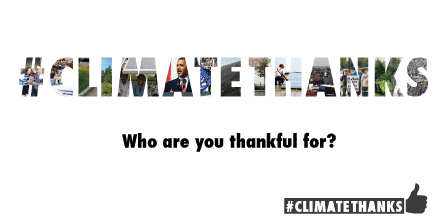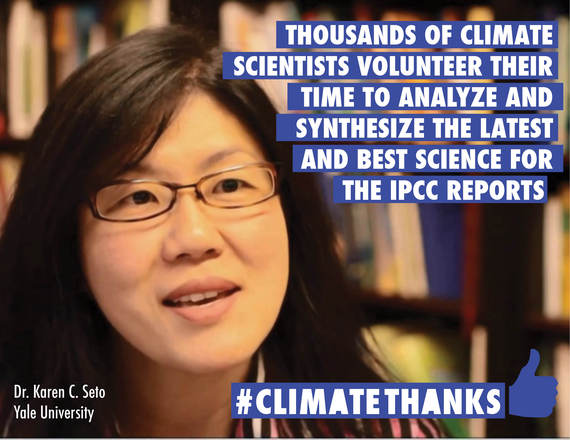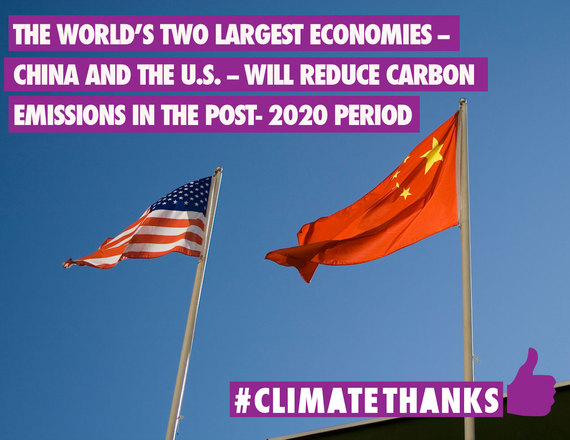Today, as Thanksgiving approaches and we reflect on what we are grateful for, thousands are taking to Twitter to celebrate the climate movement with a simple message rarely heard in this doom and gloom issue: Thanks. The message of #ClimateThanks, which has reached millions by now, embodies a profound shift in the climate movement.
Fear and dread dominated traditional environmentalism but our research at the Yale Project on Climate Change Communication shows that fear is a less sustaining motivator than hope. The new climate movement celebrates its struggle with hope and embraces the challenge of addressing a warming planet.
Fortunately, the climate change movement and all those taking actions have a lot to celebrate this year. The #ClimateThanks conversation highlights signs of progress and hope both big and small. On the international front, we celebrate the US-China agreement and Germany's solar energy economy. Here at home we thank teachers for talking about climate science in the classroom, and personally I show off about my mom, who rides her bike to work everyday.
Yet this shift in the climate change movement, what some refer to as Climate 2.0, comes not a moment too soon. The next year and a half are critical. The new hope must be harnessed and the revitalized movement galvanized into sustaining the power necessary to finalize EPA regulations, negotiate an international treaty and set the next presidential agenda.
Climate 1.0 had no shortage of failure. Since 1988 when Jim Hansen first testified about global warming to Congress, there has been no major federal legislation, no comprehensive international agreement, and plenty of denial amongst many of our political leaders. The failure four years ago to pass the the Kerry-Graham Bill left the environmental community isolated and broken. The #ClimateThanks conversation of 2010 would not have been much fun.
2014 is a new horizon. Since last Thanksgiving, major accomplishments in the science, policies and culture of climate change in the U.S. have been achieved. This past spring brought a deluge of definitive scientific reports on the problem, its solutions and the role of human society in both. As one #ClimateThanks Tweet notes, "Thousands of climate scientists volunteer their time to analyze and synthesize the latest and best science for the IPCC reports".
There is a lot to celebrate politically with the first ever EPA limits on coal-fired power plants significantly cutting carbon emissions and leading to public health and climate benefits. The recent China deal broke arguably the largest barrier to political progress on climate in the U.S. and internationally. With this agreement and China's announcement that it's starting national carbon pricing in 2016, the China excuse is no longer an effective opposition.
Equally important to these political and scientific milestones is a the cultural shift around climate. My organization's research shows belief in climate change is slowly but steadily on the rise. What may be more important however are the millions willing to take action, even political action, to solve climate change. According to a study this fall, 26 percent of Americans are willing to join or are currently participating in a campaign to convince elected officials to take action to reduce global warming.
We saw the power of these numbers when 400,000 took to the streets in New York City and cities around the world this September. The People's Climate March brought more people together under the banner of climate change than any event in history. The March represented something more important to Climate 2.0 than numbers or hope. It was diverse and inclusive. During the March, the world saw how the climate movement is not just environmentalism, but is also about socio-economic justice, social and racial equality, indigenous rights, workers rights and more.
Tomorrow as we sit down to give thanks, American families and friends will come together despite differences (and despite the fact that Aunt Sally is not happy about the 15 hours she had to drive). The climate movement must do much of the same. #ClimateThanks is small -- and on Twitter nonetheless -- but the conversation shows how to come together in celebration and build on successes.


